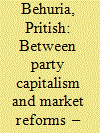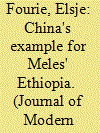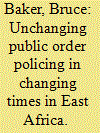|
|
|
Sort Order |
|
|
|
Items / Page
|
|
|
|
|
|
|
| Srl | Item |
| 1 |
ID:
142547


|
|
|
|
|
| Summary/Abstract |
Traders in Cotonou (Bénin), a prominent hub in the Euro–West African second-hand car trade, traditionally sold cars imported from Europe. Since the 2000s however, more and more cars are being imported from the US. Anthropological study of one group of entrepreneurs active in this new business, traders from Niger, reveals an African entrepreneurship at work that follows a distinct social pattern: traders are groomed in close kinship ties in West Africa and then develop new social ties with overseas migrants. Their trade thus becomes embedded in more globalised networks, yet at the same time it loosens and that works against profitable business. Close analysis of their careers reveals a cultural pattern that compels entrepreneurs to become traders, economic opportunity notwithstanding. Whether this is representative of Africa's changing place in the global economic order remains to be seen; however, this article suggests how culture in entrepreneurship may be key to understanding that.
|
|
|
|
|
|
|
|
|
|
|
|
|
|
|
|
| 2 |
ID:
142551


|
|
|
|
|
| Summary/Abstract |
Different strategies have been used by the Rwandan government to promote capitalist accumulation. In some sectors, party and military owned enterprises are predominant. In others, the government has chosen to embrace market-led reforms. Ultimately, the vulnerability experienced by ruling elites contributes to the choice of how capital accumulation is promoted in different sectors. Ruling elites use party and military enterprises to centralise rents and establish control over the direction of economic policy. However, centralising rents is a political choice and excludes individuals from developing access to rents. The pyrethrum sector shows that the use of such groups has resulted in unequal outcomes despite increases in productivity. Reduced international prices have stunted further productivity. Conversely, the mining sector shows evidence of the pursuit of market-led reforms. These reforms have been accompanied by rapid growth in domestic production and exports. Foreign investment was necessary in order to bring capital and expertise to the sector. However, the government has struggled to retain the capacity to enforce legislation and discipline foreign investors in line with national priorities. Both sectors show evidence that ruling elites have been prompted by vulnerability to commit to economic development. Constraints that have accompanied strategies pursued in these sectors have forced the government to work ‘reactively’ to achieve strategic targets.
|
|
|
|
|
|
|
|
|
|
|
|
|
|
|
|
| 3 |
ID:
142546


|
|
|
|
|
| Summary/Abstract |
The past decade has seen the rapid rise of concepts such as the ‘China Model’ and the ‘Beijing Consensus’, yet more recent trends suggest a waning of their popularity. This article finds that the problem with the literature on the China model lies less with the concept itself than with a tendency to apply the term in an atheoretical and unempirical manner. From 2005 until at least 2012, Ethiopian elites from the upper echelons downwards were indeed engaged in a conscious and voluntary attempt to emulate aspects of China's perceived developmental successes. Drawing on interviews with 46 such elites, as well as on theories of lesson-drawing and cross-societal emulation, the study suggests that China may act as an example to countries seeking to achieve rapid modernisation and to navigate the perilous waters of political and economic globalisation. It is only by historicising and contextualising the ‘China Model’ within the older story of selective incorporation by certain ‘latecomer’ countries, however, that its true influence – and limits – can be understood.
|
|
|
|
|
|
|
|
|
|
|
|
|
|
|
|
| 4 |
ID:
142548


|
|
|
|
|
| Summary/Abstract |
Guinea-Bissau has been regularly described as a ‘narco-state’. Yet, few studies analyse how drug trafficking has evolved here. Based on extensive interviews in Guinea-Bissau over several years, this paper documents the process. It concludes that using the term ‘narco-state’, where much of the state has little or no capacity, is inappropriate. A better approach is to analyse the actions of key players as an elite protection network. In Guinea-Bissau, that network did not act on its own, but relied on a series of ‘entrepreneurs' who operated as an interface between traffickers and the elite. While the military as an institution is often said to be in charge of trafficking, exclusive control by high-ranking military personnel within the elite network only occurred relatively late. Senior soldiers' attempts to provide more than just protection, and to enter the drug market themselves, led to the network's undoing.
|
|
|
|
|
|
|
|
|
|
|
|
|
|
|
|
| 5 |
ID:
142545


|
|
|
|
|
| Summary/Abstract |
West African elites have successfully argued for an Economic Partnership Agreement Development Programme (EPADP) as part of free trade negotiations with the European Commission. ECOWAS officials state that the EPADP is necessary to realise the ‘development dimension’ of trade. In particular, they have (re)articulated Europe's own narratives relating to Aid for Trade and private sector development – insisting that the European Commission delivers on its promises. Accordingly, European negotiators have conceded the principle of the EPADP, stating that around €6·5 billion will be delivered. This article, however, examines the likely (in)capacity of the EPADP to meaningfully marry trade and development in the context of premature liberalisation under Economic Partnership Agreements (EPAs). Crucially, it argues that West African extraversion in terms of EPADP resources may entrench predatory elites while locking-in ECOWAS states into inequitable trade structures that re-embed poverty in the region.
|
|
|
|
|
|
|
|
|
|
|
|
|
|
|
|
| 6 |
ID:
142550


|
|
|
|
|
| Summary/Abstract |
In December 2010 Ghana pumped its first oil and a local content law was passed in 2013 to promote local participation in the oil and gas industry. This paper examines Ghanaian entrepreneurial activities and the dynamics of local participation in the emerging oil and gas sector. We explore Ghanaian entrepreneurs' strategies of mobilising networks to acquire information, build trust, raise financial capital and reduce risk with the aim to gain entry, win contracts and participate in the oil and gas industry. We argue that the resources and strategies activated by entrepreneurs embedded in the context of the Ghanaian business environment are inadequate and problematic when deployed in the context of the international oil and gas industry. The international oil companies' cost-intensive standard requirements and state officials' informal interventions further limit local firms' prospects for participation in the oil and gas industry.
|
|
|
|
|
|
|
|
|
|
|
|
|
|
|
|
| 7 |
ID:
142549


|
|
|
|
|
| Summary/Abstract |
This article offers a political analysis of the practices and motives of public order policing in Ethiopia and Uganda. It offers an explanation of the continuation of forceful tactics against political protest in a context of changing methods of information gathering, organisation and mobilisation by urban activists resulting from their access to internet and communication technology. It finds the two regimes, as anocracies, are caught between legally allowing protest and yet, conscious of their fragility, determined to crush opposition. For the latter approach, their militarist leaderships rely heavily on continued police violence. The paper concludes that failure of the police to adapt their public order policing to the new protest environment leaves them increasingly ineffective and unpopular. It is likely to provoke an escalation of violence and may both undermine the legitimacy of their regimes and reverse their attempts to open political space that justified their rebellions against former autocracies.
|
|
|
|
|
|
|
|
|
|
|
|
|
|
|
|
|
|
|
|
|